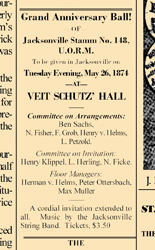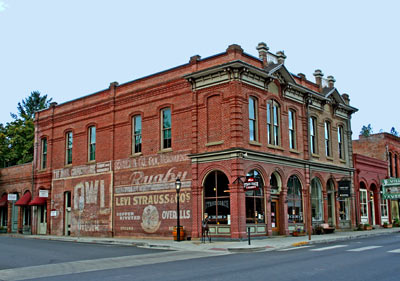With Oktoberfest beginning later this month, it seems an appropriate time to celebrate Southern Oregon’s pioneer community of German-speaking settlers. Although comprising only a quarter of the Rogue Valley’s population, first and second-generation immigrants from what are now Germany, Switzerland, and Austria were the dominant ethnic element, contributing significantly to the tenor and scope of local life.
Think Peter Britt, Kaspar Kubli, William Hoffman, Herman von Helms, John Orth, Max Muller, Joseph Wetterer, John Bilger, Henry Klippel, and many more. They brought with them their energy, their culture, and their social organizations—the Turnverein, Eintracht, Stamm, and Harmonie.
The Turnverein was a political and gymnastic organization that originated in Berlin. Although many of the “Turners” played prominent roles in Jacksonville and Jackson County politics, the Jacksonville organization, formed in 1863, was primarily athletic and social. Clad in white uniforms, members worked out twice a week in the second floor ballroom of Viet Schutz brewery or in the open air. Exercises included parallel bars, the pommel horse, medicine balls, and Indian clubs. Their public gymnastic displays of fencing, tumbling, and human pyramids both amused and entertained local residents.
The Turners’ healthy physical outlet, combined with the social opportunities it afforded, attracted growing numbers of young men who had never been to Germany or Switzerland. And despite the organization’s foreign origin, local Turners were so pro-American that they were frequently called upon to manage Jacksonville’s Fourth of July celebrations.
 The Eintracht was a mutual aid society for German and Swiss families that also assisted new arrivals from the old country. In Jacksonville, it became a social organization as well, sponsoring picnics, field trips, athletic contests, dinners, dances, and German language dramatics. Fundraising activities included raffles, with the German “fraus” contributing their fancy needlework and pastries as prizes.
The Eintracht was a mutual aid society for German and Swiss families that also assisted new arrivals from the old country. In Jacksonville, it became a social organization as well, sponsoring picnics, field trips, athletic contests, dinners, dances, and German language dramatics. Fundraising activities included raffles, with the German “fraus” contributing their fancy needlework and pastries as prizes.
Jacksonville’s non-Catholic German and Swiss immigrants also became “zealous converts to the American craze for lodges and secret societies.” They joined the Masons and Odd Fellows in significant numbers, but their lodge of choice was the Improved Order of Red Men. By 1881, Jacksonville boasted three lodges: Pocahontas Tribe No. 1, which was primarily English speaking; Jacksonville Stamm No. 148, which kept all records in German; and a Haymakers Association. In 1884, the combined societies contracted with brick mason George Holt for the construction of Red Men’s Hall at the southwest corner of California and 3rd streets.
Traditionally, the Red Men sponsored a grand ball on May 12th to honor their patron, St. Tamany. They also organized New Year’s masquerades, and in summer hosted elaborate outings at Bybee’s grove that included feasting, canon salutes, oratory and dancing.
And while musical entertainment through most of the west was basically limited to “fiddler contests” where “musicians scratched away by ear, with no concept of harmony,” early Jacksonville was a musical culture center. Jacksonville may have been an isolated mining town miles from the nearest urban centers, but its Swiss-German community enthusiastically shared its choral and instrumental musical traditions.
They organized the Jacksonville Harmonie, a loose musical association that engaged the services of various musical instructors and sponsored several musical groups including a string band, the Jacksonville Silver Cornet Band, a brass band, and a German singing club. Almost everyone in town owned a musical instrument, and several fine German music instructors opened music academies, conducting “singing schools” and giving music lessons to many of the village children.
John Trudeau may have even been channeling these early German settlers when he launched the Britt Festival in 1963, since Peter Britt himself hosted al fresco concerts on the Britt grounds. A 1916 Portland Evening Telegram tribute to Britt noted:
“From the north porch of his former house one secures a wonderful view of the historic Rogue River Valley. The porch is a large one, and, on Sunday afternoons years ago, the city band would play and friends of old Peter Britt would sit out under the trees and enjoy the music….”
Pioneer Profiles is a project of Historic Jacksonville, Inc., a non-profit whose mission is helping to preserve Jacksonville’s Historic Landmark District by bringing it to life through programs and activities. Visit us at www.historicjacksonville.org and follow us on Facebook/historicjville for upcoming events and more Jacksonville history.
